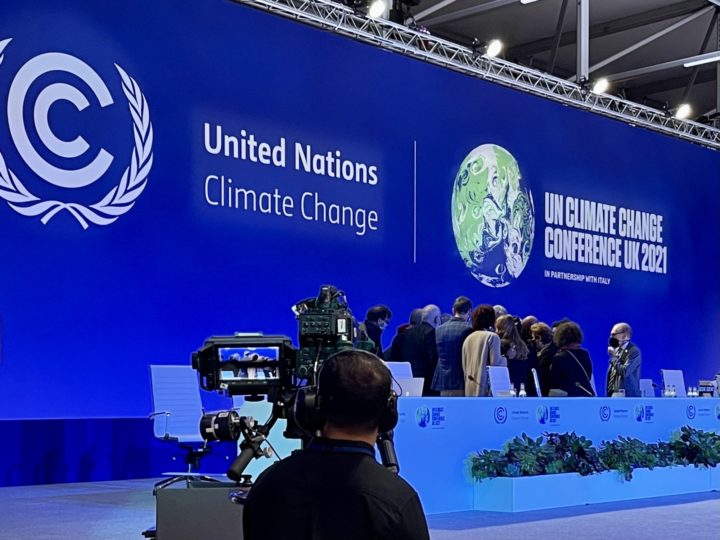What next for the UK UNFCCC presidency?
After COP26, there is a lot for the UK to do in the coming year to implement the Glasgow Climate Pact & build towards COP27.

By Gareth Redmond-King
@gredmond76Share
Last updated:
The presidency of the United Nations Framework Convention on Climate Change (UNFCCC) rotates. The UK assumed the presidency on the first day of COP26 in Glasgow; it holds it for a further 11 months, until COP27 in Egypt, November 2022. To progress implementation of the deal reached in Glasgow, there are five key areas for the UK presidency to advance over the course of the next year. They are:
- Staffing and resourcing the UK presidency team
- International diplomacy to drive improved emissions reduction plans globally
- Shifting financial flows to support developing countries
- Expanding and delivering on the sector deals
- Delivering on domestic targets
Having delivered the Glasgow Climate Pact at COP26, the UK presidency, led by COP President Alok Sharma, now needs to steward delivery of the COP26 outcome, which all parties signed up to, and work with Egypt to plan for what must be achieved by COP27. These are the key areas against which the UK presidency will be challenged and judged.
1. Staffing and resourcing the UK presidency team
The UK government will now be expected to ensure that a fully staffed, experienced and well-resourced UK presidency team is in place to drive forward the implementation of the Glasgow Climate Pact.
This team will need to work across Whitehall, with the full authority of the Prime Minister, to drive delivery both of the UK’s share of what it agreed to as one of the parties to the pact, and continued UK leadership on climate to support and facilitate climate action from other nations.
Alok Sharma will need the position and authority to influence decisions being made by his colleagues in other government departments on areas which could undermine the UK’s position with other nations – for example on trade deals, UK spending, planning (e.g. on a possible coal mine in Cumbria), and on new UK oil and gas exploration.

2. International diplomacy to drive improved emissions reduction plans globally
The world is currently on track for emissions to rise by 13% this decade; to be on track to keep global temperature rises to 1.5°C, emissions must fall by 45% by 2030. This is why COP26 decided countries could not wait until 2025 to return with more ambitious pledges, but rather needed to accelerate the existing process set out in the Paris Agreement.
Parties whose targets are not yet aligned with Paris goals are committed to submit updated net-zero emissions pledges ahead of COP27, and all parties are required to submit more ambitious plans in 2023, ahead of the planned global stocktake.
The UK will need to show leadership on its own ambitious nationally-determined contribution (NDC: emissions pledge made under the Paris Agreement), but also to leverage action:
- From all nations who made commitments on ‘sector deals’ at Glasgow (e.g. on coal, methane and deforestation) to ensure those are built into NDCs to strengthen them further.
- From laggard nations like Australia, Brazil and Russia to strengthen their very weak targets.
- From big emitters like the US and China to commit to short-term actions this decade to get on track for their net-zero pledges.
- From wealthy nations like the US, EU, Canada, Japan and South Korea to commit more financial support to enable emissions cuts from developing nations. This might follow the example of the deal announced at Glasgow for the UK, EU and US to support South Africa to hasten their coal phase-out.

3. Shifting financial flows to support developing countries
The most difficult areas in Glasgow, and where least progress was made, relate to support for poorer nations to reduce their emissions and to adapt to the impacts of climate change.
Climate finance
Wealthy nations have failed to deliver on their pledge of $100bn a year in climate finance by 2020 and will not hit that level until at least next year, and possibly 2023. This, and the fact that the finance is not yet evenly split between mitigation (emissions cuts) and adaptation (to climate impacts – most critical for developing countries), requires progress.
This will mean:
- Leveraging more finance from wealthy nations – most of which fall short of assessments of what their fair share of contributions to the $100bn climate finance should be – and ensure that half of it is made available for adaptation.
- Working with other donor nations to pressure multi-lateral development banks to ensure all their financial flows are 1.5°C aligned, increasing both their contributions to climate finance for developing nations, and the proportions available for adaptation – including furthering the proposition made by Barbados’ Prime Minister Mia Mottley for billions in IMF special drawing rights (SDRs) to be made available to fund developing countries’ climate action.
- Making real some of the bold, but as yet unfounded claims, by finance institutions to be making trillions of dollars available for climate action – including by working in support of UN Secretary-General Antonio Guterres’ proposed new body to police corporate greenwashing.
Loss and damage
Whilst some limited progress was made on loss and damage, COP26 fell short of what developing nations called for – a finance facility to support them in crisis response and paying for losses and damage exacted by climate impacts on their economies, infrastructure and people.
Both of these issues led to considerable anger from small island states and other climate vulnerable nations. The UK presidency will be expected to drive progress on both if the UN process is retain the confidence and trust of developing nations.
4. Expanding and delivering on the sector deals
At COP26, more than 100 countries pledged to cut methane emissions this decade, 23 countries joined the list of nations committed to phasing out coal, 39 countries and development banks promised to end finance for fossil fuels, nations responsible for 85% of the world’s forests said they would work to end deforestation by 2030, and a group of countries and companies made a pledge to speed up phase out of petrol and diesel vehicles around the world.
Climate Action Tracker concluded that the pledges on forests, coal, vehicles, and methane could, if delivered, narrow the gap towards 1.5°C this decade by 9%.
The UK presidency will now be expected to:
- Work with countries to build these commitments into country pledges to grow ambition.
- Hold signatories to account for the delivering on the pledges that they made.
- Work with the other nations that initiated pledges to add to the countries signed up to each.
- Draw together the pledges on coal, fossil fuel financing, and ending exploration for and production of fossil fuels with the deals to support individual coal-dependent nations to drive delivery of the historic commitment in the Glasgow Pact to ‘phase down’ fossil fuels, and work to ending fossil fuel subsidies globally.
Below is an interactive infographic showing which sector deals different countries have signed up to.
5. Delivering on domestic targets
The commitments made in Glasgow are complex and ambitious – though not yet ambitious enough to close the gap to 1.5°C. Driving delivery will be easier for the UK presidency to achieve if it can continue to demonstrate leadership at home.
That will mean:
- Policies and investment necessary to deliver the UK’s net-zero strategy, ensuring the UK can deliver on its world-leading NDC commitment to cut emissions by at least 68% by 2030, and so realise the considerable economic benefits of doing so.
- Increasing its own commitment on climate finance, including: further country deals like that with South Africa; returning overseas development aid commitment to 0.7% of UK GDP, and using its power as a wealthy donor nation to put pressure on multi-lateral development banks, and on the City of London – which a WWF/Greenpeace report recently calculated would be the ninth biggest emitter globally, if it were ranked amongst countries.
- No new fossil fuel intensive infrastructure – having led the way on coal, the UK should be aiming to sign up to the Beyond Oil and Gas Alliance to set an end-date for oil and gas.
- Leading the way on getting deforestation out of the UK supply chain – including raising the bar beyond just deforestation that is deemed illegal in the country of origin.
Share